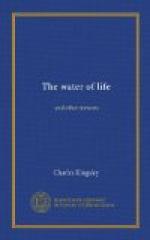Nothing can happen to England, is, I fear, the feeling of Englishmen. Carnal security is the national sin to which we are tempted, because we have not now for forty years felt anything like national distress; and Britain says, like Babylon of old, the lady of kingdoms to whom foreigners so often compare her,—’I shall be a lady for ever; I am, there is none beside me. I shall never sit as a widow, nor know the loss of children.’
What, too, if that same security and prosperity tempts us—as foreigners justly complain of us—to set our hearts on material wealth; to believe that our life, and the life of Britain, depends on the abundance of the things which she possesses? To say—Corn and cattle, coal and iron, house and land, shipping and rail-roads, these make up Great Britain. While she has these she will endure for ever.
Ah, my friends—to people in such a temptation, is it wonderful that a good God should send a warning unmistakeable, though only a warning; most terrible, though mercifully harmless; a warning which says, in a voice which the dullest can hear—Endure for ever? The solid ground on which you stand cannot do that. Safe? Nothing on earth is safe for a moment, save in the long-suffering and tender mercy of Him of whom are all things, and by whom are all things, without whom not a sparrow falls to the ground. Is the wealth of Britain, then, what she can see and handle? The towns she builds, the roads she makes, the manufactures and goods she produces? One touch of the finger of God, and that might be all rolled into a heap of ruins, and the labour of years scattered in the dust. You trust in the sure solid earth? You shall feel it, if but for once, reel and quiver under your feet, and learn that it is not solid at all, or sure at all; that there is nothing solid, sure, or to be depended on, but the mercy of the living God; and that your solid-seeming earth on which you build is nothing less than a mine, which may bubble, and heave, and burst beneath your feet, charged for ever with an explosive force, as much more terrible than that gunpowder which you have invented to kill each other withal, as the works of God are greater than the works of man. Safe, truly! It is of God’s mercy from day to day and hour to hour that we are not consumed.
This, surely, or something like this, is what the earthquake says to us. It speaks to us most gently, and yet most awfully, of a day in which the heavens may pass away with a great noise, and the elements may melt with fervent heat, and the earth and the works which are therein may be burnt up. It tells us that this is no impossible fancy: that the fires imprisoned below our feet can, and may, burst up and destroy mankind and the works of man in one great catastrophe, to which the earthquake of Lisbon in 1755—when 60,000 persons were killed, crushed, drowned, or swallowed up in a few minutes—would be a merely paltry accident.




